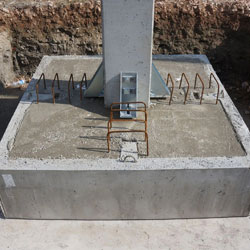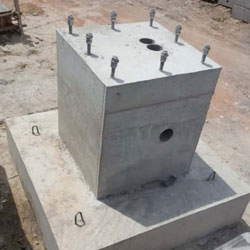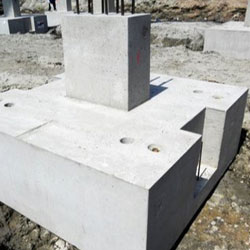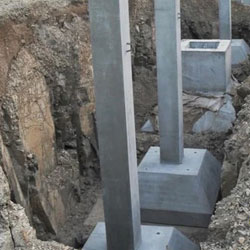RCC Precast Foundations
The precast foundation is a reinforced concrete element made up of a tied rebar beam cage incorporated within a semi-precast concrete element which acts as formwork. The element can be used in the construction of column and wall foundation of any type and is suitable for any elevated structure.
The use of the precast foundation eliminates all those inconveniences that crop up during the construction of foundations using traditional methods (for example, cast-in-place), aiming to halve the costs involved in constructing a foundation structure, greater jobsite safety for workers and a turnaround speed without precedence.
PRECAST CONCRETE is a construction product made by casting concrete in a reusable mold or “form” in plant-controlled conditions. UNLIKE TRADITIONAL CONCRETE, which is formed, poured, and cured on site in varying weather conditions, precast concrete is made in a manufacturing environment, usually at an off-site facility. It is then transported after it is cured and finished, meaning when it reaches the construction site, it’s ready to be placed into its final position. This process offers tremendous versatility during the design and construction phases of a project, and it can be adapted for a wide variety of structures, from buildings and bridges to tunnels and pipes. In fact, some of the most famous and COMPLEX STRUCTURES IN HISTORY WERE BUILT USING PRECAST CONCRETE. Other construction materials like steel, wood, and masonry all have their place, but the benefits of precast concrete are numerous and undeniable.

One of the most significant advantages of using precast concrete in construction is higher quality control management and superior tolerance. Because the production of precast elements occurs in a factory setting where the concrete mixing, curing, and quality checks adhere to standardization and careful monitoring by a specialized resident staff, precast elements achieve higher levels of consistency and quality than traditional concrete construction methods.
Another significant advantage of precast concrete is ITS ABILITY TO EXPEDITE CONSTRUCTION PROJECTS. Precast construction can reduce construction schedules primarily because fabrication of the components takes place concurrently with site and foundation work. When compared to other methods of construction, the amount of time needed for site and foundation work is the same. What changes between the methods is the amount of time required to build the superstructure and enclosure? Since precast concrete elements are ready for installation when they arrive at the job site, considerable time savings can be achieved. Roughly six to seven thousand square feet of surface area can be erected in a single day using only a crane and a small crew.
PRECAST CONCRETE OFFERS SUBSTANTIAL COST SAVINGS throughout the construction process. To understand this, it is important to look beyond material cost comparisons and examine how it impacts all the variables. Compression of the construction schedule means reduced interim financing and a faster path to revenue generation for the project owner. By reducing material waste, transportation costs, and labor expenses, precast concrete also contributes significantly toward lowering general condition costs during construction. Bulk manufacturing of precast concrete elements allows for economies of scale, which reduces unit costs. When compared to other materials, its longer service life and lower life-cycle costs result in reduced operational and maintenance expenses as well.
Advantages of Precast Concrete Foundation
- The precast concrete foundation is constructed in a controlled environment and hence it follows strict quality control.
- The precast concrete foundation units are stronger and lighter when compared to other competing materials.
- Employing a precast concrete foundation construction technique helps to minimize the construction period.
- The precast construction method has less weather dependency. Weather is a concern only during its installation.
- The foundation units produced by this method are leak-resistant and are less susceptible to cracking.
- Precast concrete foundation units can be manufactured in varied architectural finishes.
- The manufacture and installation of these units hence are environmentally friendly compared to on-site foundation construction.
- This method reduces the overall cost of the builders and homeowners.
- Precast foundation units can be employed for both residential and light commercial foundation construction.



